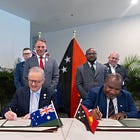PNG Defense Treaty Draws Sharply Divided Expert Views on Strategic Risks, Democratic Process
This piece is freely available to read. Become a paid subscriber today and help keep Mencari News financially afloat so that we can continue to pay our writers for their insight and expertise.
Today’s Article is brought to you by Empower your podcasting vision with a suite of creative solutions at your fingertips.

Papua New Guinea’s newly approved defense treaty with Australia has exposed deep divisions among security experts, with a prominent think tank analyst calling it a natural progression while the island nation’s former defense chief warns the pact makes PNG a “soft target” and lacks democratic legitimacy.
The contrasting assessments emerged Thursday as PNG Prime Minister James Marape confirmed his cabinet approved the historic agreement with an absolute majority, setting the stage for parliamentary debate that retired Brigadier General Gerry Singirok said remains critically absent from public discourse.
Oliver Nobetau, project director of the Australia Papua New Guinea Network at the Lowy Institute, told ABC News the treaty represents expected strategic evolution accelerated by regional circumstances and Australia’s military recruitment challenges.
“I don’t think that much has changed after the initial communique was signed,” Nobetau said. “I think what we saw that there was some concerns being raised, especially on the PNG side or on questions of sovereignty and how this will affect the relationship with China. But both governments have been quite adamant that this is a major win for both sides.”
Singirok, who commanded PNG’s defense forces, offered a starkly different view in a Sky News Afternoon Agenda interview, warning the agreement could replicate World War II dynamics when PNG became a battleground protecting Australia from Japanese invasion.
“So what the treaty does is that basically the clause is drawn in there so that there’s interoperability, but more importantly, the absorption and incorporation of Papua New England citizens or Papua New Defence Force being absorbed into the Australian order of battle so that in the event of Australia being attacked, Papua New Guinea is a soft target, as we’ve seen in Second World War,” Singirok said.
When asked directly whether the treaty puts a target on PNG’s back given China’s growing regional influence, Singirok responded: “Absolutely.”
Truth matters. Quality journalism costs.
Your subscription to Mencari directly funds the investigative reporting our democracy needs. For less than a coffee per week, you enable our journalists to uncover stories that powerful interests would rather keep hidden. There is no corporate influence involved. No compromises. Just honest journalism when we need it most.
Not ready to be paid subscribe, but appreciate the newsletter ? Grab us a beer or snag the exclusive ad spot at the top of next week's newsletter.
The retired general reserved his sharpest criticism for the Marape government’s failure to consult PNG citizens on an agreement he characterized as constitutionally significant.
“There has been nil. There has been no debate, public debate,” Singirok said. “No legislators, no politicians have gone back to the electorates to debate, to get views of the public about the implication of this defense treaty with Australia.”
He argued cabinet approval proves insufficient for such a momentous decision.
“Marapis executive government can say whatever they want in the cabinet, but the matter has to be debated fully on the floor of parliament,” Singirok said. “Now, the votes have to be taken.”
Nobetau acknowledged sovereignty concerns represent a significant hurdle given Australia’s history as PNG’s colonial administrator until 1975 independence.
“This is something that Papua New Guineans themselves are quite concerned about,” Nobetau said. “It’s no tricky, it’s a big hurdle for, I think, Australia to overcome. Australia has obviously the history with PNG as its colonial administrator, and the questions are being asked, is this a return to sort of neo-colonialism now?”
The Lowy Institute analyst rejected that characterization, saying both nations enter the agreement as equals.
“I don’t think that’s the case,” Nobetau said. “I think both of the parties are entering into this in equal footing as partners in the Pacific to try and contribute back to regional stability.”
Singirok situated his concerns within PNG’s World War II experience, when major Pacific battles unfolded on PNG territory as Allied forces prevented Japanese advances toward Australia.
“My concerns are predates back to the historical relationship that Papua and New Guinea at that time had with Australia, keeping in mind that Australia was a former colony, administrative, sorry, and yesterday’s enemy was Japan,” Singirok said.
He detailed how the strategic imperative to protect Australia drove combat operations across PNG.
“In order to protect Australia from being invaded by the Imperial force, the battle had to be fought in the Pacific and in Papua and New Guinea,” Singirok said. “And serious battles were fought in Milne Bay and in Oro or Northern Province and just at the north of Port Morsby along Kokoda.”
The retired general characterized current developments as “history repeating itself” and suggested PNG’s government “lacks certain aspects of strategic wisdom.”
Nobetau emphasized the treaty addresses Australia’s recruitment crisis while creating economic opportunities for PNG citizens.
“If we’re looking at the broader picture for Australia I think Australia’s been facing a bit of a recruitment crisis as well within the ADF and the biggest one of the key elements that’s making headlines is the direct recruitment of Papua New Guinean citizens into the Australian Defence Force now to assist with that sort of recruitment shortfall,” Nobetau said.
He noted Marape himself acknowledged PNG’s defense limitations during the September communique signing.
“James Marape, during the signing of the communique, during the press statement that was said, he said, quite frankly, that the PNG Defence Force doesn’t have the capability to protect PNG from any sort of territorial incursions,” Nobetau said. “And with this partnership with Australia, this enhanced partnership through the treaty, we can have greater capability partnerships and resource sharing as well.”
Singirok pointed to recent military infrastructure developments as evidence of incremental strategic positioning by Australia and the United States, referencing the 2018 defense relationship pushed by then-Vice President Mike Pence.
“Only in 2018, I think it was the United States Vice President Mike Pence forced a defense treaty or relationship with Papua New Guinea so that the Lombra Naval Base will be developed,” Singirok said.
He noted Australian company CLAF International received a $340 million contract for the Lombrum project despite PNG lacking significant naval capabilities.
“I believe the Australian government, CLAF International, was awarded that big contract. It’s about 340 million Australian dollars spent on building the Lombra Naval Base,” Singirok said. “Now, the question is that Papua New Guinea does not have a significant naval fleet.”
The former commander cited additional U.S. plans to build what he described as the largest fuel station in Manus as further evidence of escalating military positioning.
“Just this year, the U.S. government has announced that it’s going to build the largest fuel station in Manus,” he said.
Singirok characterized Australia as acting on behalf of American strategic interests.
“As a strategist, I can already see it’s an incremental step that Australia is undertaking on behalf of USA, because Australia, I believe, is acting as a proxy to USA by reinforcing and supporting the Manus Naval Base,” Singirok said.
He connected current developments to Australia’s AUKUS nuclear submarine program and expressed hope the treaty doesn’t target perceived northern threats.
“So I’m just looking ahead that I hope this treaty is not for something that Australia and US are seeing as a threat from the north,” Singirok said.
The retired general raised fundamental questions about the treaty’s strategic foundation.
“The big question that keeps begging is that, who is the common enemy here?” Singirok said. “In the absence of that, we cannot say that China or some fictitious country to the north is our enemy.”
Nobetau said the treaty text remains confidential despite cabinet approval.
“There’s not much that’s been known uh i think the treaty itself has been quite it’s been kept under wraps and i think because of really the significance of the treaty,” he said.
Known elements include recruitment provisions, defense alliance framing, and commitments to respect sovereignty. The agreement must reconcile asymmetric threat perceptions between the two nations.
“The framing of the wording around a defense alliance which has been something that was concerning for a lot of parties on how are they going to marry the asymmetry of security threats and threat perceptions while australia sees china as its biggest security threat png says that its biggest security threat is more internal,” Nobetau said.
China’s reaction surprised both countries, according to Nobetau. The Chinese embassy released a Facebook statement saying the treaty should not unfairly affect third-party interests.
“I think that was a shock, I think, not only for Australia, but also for PNG as well, right?” Nobetau said. “The Chinese embassy released a statement on Facebook saying that it should not prevent or sort of unfairly or unjustly affect third-party interests.”
Nobetau suggested China’s objection to a purely military treaty revealed underlying defense intentions by Beijing.
“If there are concerns around China on third parties being excluded, then I think it speaks to maybe an underlying defence intention or military intentions by China as well,” he said.
Public reaction in PNG has centered on sovereignty and China relations, according to Nobetau.
“It’s been a bit of a mixed bag,” he said. “The two things that you hear most about from the PNG public is one, concerns around sovereignty and the other as well as on how this will affect the relationship with China.”
Marape has attempted to separate security and economic spheres in PNG’s international relationships.
“The Papua New Guinea government, especially James Amarape, has come out and sort of demarcated how they see the bilateral relationships moving forward now within the security space, siding with Australia’s traditional Western allies, and definitely in the economic and trade space, building up that relationship with China,” Nobetau said.
Singirok warned that constitutional amendments may be required to accommodate provisions allowing PNG soldiers to serve alongside Australian forces.
“In the event that the treaty allows us to—Parpentingly soldiers to work alongside Australia, certain clauses in the Constitution must be changed to cater for that,” Singirok said. “In the absence of that, then I say that in the absence of a public debate or legislative debate, then the constitution or the treaty is vulnerable as it is.”
Nobetau said parliamentary debate will follow cabinet endorsement and formal signing.
“After the Cabinet endorsement, we will see signing and the ratification process will take place,” Nobetau said. “For PNG, what this looks like is a debate on Parliament, and we will be seeing how well they address these issues.”
The September delay when Prime Minister Anthony Albanese visited PNG appeared procedural, according to Nobetau, with both leaders having just returned from the United Nations General Assembly.
“With the PNG delay, it seemed to be more of a procedural issue, and I think we can be comfortable in saying that it was, right?” Nobetau said. “James Maripa just returned from what I stand yesterday from UNGA, same with Albanese and this seems to be the first agenda item on the list now.”
Nobetau noted a similar agreement with Vanuatu appears to be losing momentum.
“The Nakamal agreement however there is not there are no winds sort of picking up on that as well so it seems to be that this one is slowly falling off the agenda list,” he said.
Singirok acknowledged treaties deserve consideration when mutually beneficial but emphasized the impossibility of assessment without seeing treaty clauses.
“Firstly, any treaty, any agreement is welcome, as long as it’s for the mutual benefit of both countries,” he said. “And in the absence of seeing the actual clauses of the defence agreement, I cannot say much other than I hope it’s in the interest of both Papua New Guinea and Australia.”
The sharply contrasting expert assessments highlight the complex political and strategic calculations surrounding the first new Australian alliance in over 70 years, as PNG moves toward parliamentary consideration that will test public support for formalizing military ties with its former colonial administrator.
Sustaining Mencari Requires Your Support
Independent journalism costs money. Help us continue delivering in-depth investigations and unfiltered commentary on the world's real stories. Your financial contribution enables thorough investigative work and thoughtful analysis, all supported by a dedicated community committed to accuracy and transparency.
Subscribe today to unlock our full archive of investigative reporting and fearless analysis. Subscribing to independent media outlets represents more than just information consumption—it embodies a commitment to factual reporting.
As well as knowing you’re keeping Mencari (Australia) alive, you’ll also get:
Get breaking news AS IT HAPPENS - Gain instant access to our real-time coverage and analysis when major stories break, keeping you ahead of the curve
Unlock our COMPLETE content library - Enjoy unlimited access to every newsletter, podcast episode, and exclusive archive—all seamlessly available in your favorite podcast apps.
Join the conversation that matters - Be part of our vibrant community with full commenting privileges on all content, directly supporting The Evening Post (Australia)
Catch up on some of Mencari’s recent stories:
It only takes a minute to help us investigate fearlessly and expose lies and wrongdoing to hold power accountable. Thanks!








